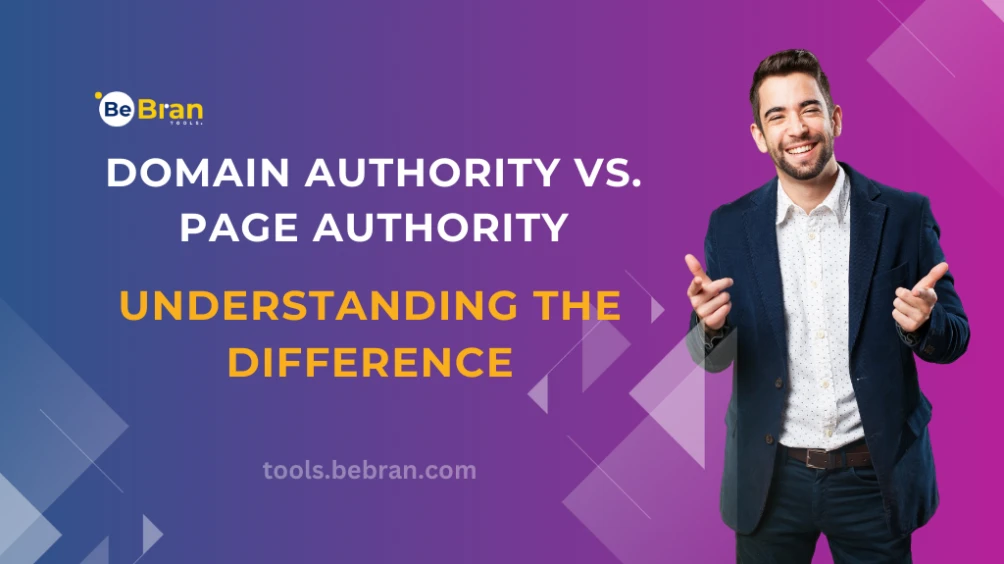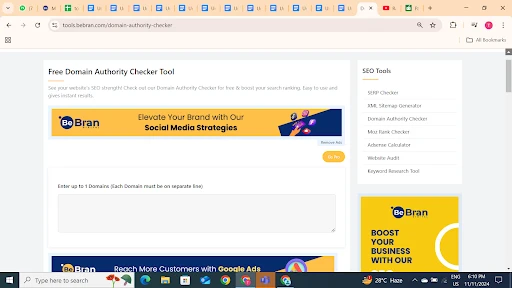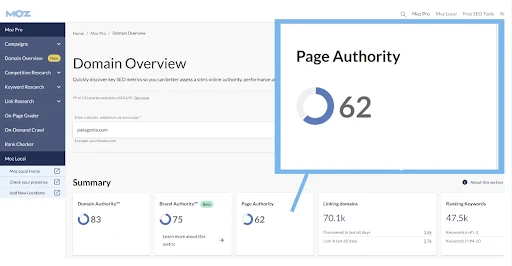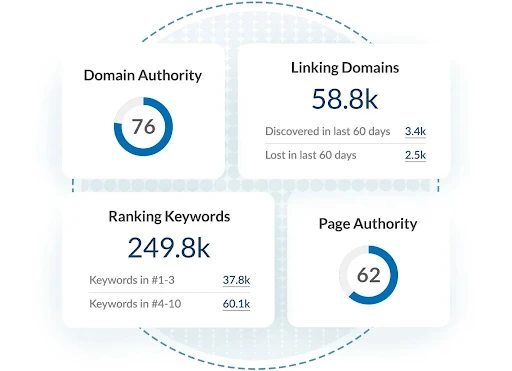
Domain Authority vs. Page Authority: Understanding the Difference
In the world of SEO, both Domain Authority (DA) and Page Authority (PA) are essential metrics for understanding your website’s performance and ranking potential. However, these two metrics serve different purposes and provide distinct insights. At BeBran, we help clients utilize DA and PA to create customized SEO strategies that enhance both site-wide authority and individual page strength. In this guide, we’ll break down the difference between Domain Authority and Page Authority and explain how both can contribute to your SEO success.
What is Domain Authority (DA)?
Domain Authority (DA) is a metric developed by Moz that measures the overall authority of an entire website or domain. Scored on a scale from 1 to 100, DA predicts how well a website is likely to rank in search engine results based on its backlink profile, linking root domains, and other factors.
- Higher DA (closer to 100) suggests a strong, trusted domain with a high likelihood of ranking well across multiple search queries.
- Lower DA (closer to 1) is typical for newer or smaller sites with fewer backlinks and less established authority.
How DA Works: Domain Authority is calculated by evaluating the quality and quantity of a site’s backlinks and linking root domains, which helps determine the site’s overall popularity and trustworthiness in search engines. While DA itself isn’t a Google ranking factor, it serves as a useful comparative metric for evaluating your site’s competitive positioning. Our tool helps clients understand their site’s overall SEO health followed by our guide to their link-building strategy. By focusing on quality backlink acquisition, we help boost our clients’ DA, which in turn enhances their entire site’s ranking potential.
What is Page Authority (PA)?
Page Authority (PA), also developed by Moz, measures the ranking strength of an individual page within a website, rather than the entire domain. Like DA, PA scores range from 1 to 100, with higher scores indicating a greater likelihood of ranking well for specific search queries.
- Higher PA (closer to 100) indicates a strong individual page that’s likely to perform well in search engine results.
- Lower PA (closer to 1) suggests that a page has less ranking potential, often due to fewer backlinks or less relevant content.
How PA Works: PA is calculated based on similar factors as DA but focuses specifically on the link profile and relevance of a single page. For example, a well-optimized blog post with high-quality backlinks from other reputable sites will have a higher PA than a page with minimal or lower-quality links. Our tool prioritizes and optimizes high-potential pages. By boosting PA for specific pages, we can help clients improve visibility for targeted keywords and drive more traffic to key areas of their site.
Key Differences Between Domain Authority and Page Authority
Understanding the differences between Domain Authority and Page Authority is essential for an effective SEO strategy. Here’s a breakdown of their key distinctions:
Feature | Domain Authority (DA) | Page Authority (PA) |
| Scope | Measures entire domain’s authority | Measures authority of a single page |
| Focus | Site-wide ranking potential | Page-specific ranking potential |
| Impact | Affects overall domain visibility | Affects individual page visibility |
| Best for | Understanding site competitiveness and link profile | Optimizing key pages for targeted keywords |
| Improvement | Requires overall backlink strategy | Requires focused link-building for individual pages |
| Use in Strategy | Guides site-wide link-building and SEO efforts | Helps prioritize important pages in SEO strategy |


Free Tools: Free Domain To IP Tool Online | Free Domain Name Search Tool Online | Free IP Address Location Tool Online
When to Focus on Domain Authority
Focusing on DA is beneficial when you want to improve the overall SEO strength of your website. Increasing DA is a long-term investment that supports visibility across all pages. We guide clients in building an effective backlink profile and creating content that attracts quality links, which ultimately contributes to sustained DA growth. By focusing on DA, we establish a strong foundation that supports overall site rankings. Here’s when it’s best to focus on DA:
- Building a Strong Backlink Profile: Securing high-quality backlinks for your entire site helps raise DA and increases your website’s trustworthiness.
- Establishing Brand Authority: DA growth helps position your site as an industry authority, enhancing brand reputation and credibility.
- Improving Site-Wide Visibility: A higher DA means better visibility for all pages, making it easier to rank across multiple topics.
When to Focus on Page Authority
PA is ideal for optimizing individual pages for specific keywords. Whether you want to boost a blog post, a product page, or a service page, improving PA helps that page perform better in search results. Our tool identifies high-priority pages and you can implement targeted strategies to increase your PA with our guidance. This includes focused link-building for specific pages, optimizing content for relevant keywords, and enhancing page usability. By improving PA, we help clients achieve visibility for their most important pages. Here’s when it’s best to focus on PA:
- Targeting Specific Keywords: When you have high-priority keywords, focusing on PA helps boost the relevant pages for those terms.
- Improving Content Depth: Creating valuable content with relevant information and resources increases the chances of earning quality backlinks for that page, thus improving PA.
- Gaining Quick Wins for High-Potential Pages: Focusing on PA for individual pages can yield quicker SEO results, as targeted pages begin to perform better in search rankings.
How DA and PA Work Together in SEO Strategy
Both DA and PA play crucial roles in a comprehensive SEO strategy. While DA helps build a strong foundation for your domain, PA allows for precision in boosting visibility for individual pages. Here’s how BeBran integrates DA and PA to maximize SEO performance:
- Building Domain Authority as a Foundation: A strong DA supports the ranking potential of all pages on the site. We focus on quality link-building, content relevance, and technical optimization to increase DA over time.
- Enhancing Page Authority for Targeted Success: With DA as a solid foundation, we identify key pages to optimize for PA, ensuring they rank well for targeted keywords. This approach allows us to drive traffic to high-value pages and achieve quicker results.
- Adapting Strategy Based on Goals: Depending on our clients’ objectives—whether site-wide authority or page-specific ranking—we adjust our strategy to focus on the appropriate metric. This adaptability ensures that our clients see both short-term wins and long-term growth.
Common Misconceptions About DA and PA
To effectively use DA and PA, it’s essential to address common misconceptions:
- DA and PA Directly Affect Google Rankings: DA and PA are not official Google ranking factors. Instead, they are Moz-created metrics that help estimate ranking potential based on link profile strength.
- DA Improves Immediately with Backlinks: DA is a long-term metric that builds gradually as you earn quality backlinks. Quick increases are unlikely, and DA gains require consistent, quality-focused strategies.
- PA Doesn’t Affect Overall SEO: While PA focuses on individual pages, improving it indirectly supports site-wide SEO by increasing traffic and visibility for key pages.
How BeBran Can Help You Improve DA and PA
At BeBran, we provide a balanced approach to DA and PA, helping clients improve both metrics through strategic link-building, content optimization, and technical enhancements. Here’s how we can support your DA and PA growth:
- Quality Link-Building for DA Growth: We develop customized backlink strategies to help clients earn high-quality, relevant links that contribute to overall DA improvements.
- Targeted Content Creation for PA: Our content team creates valuable, shareable content that naturally attracts backlinks, boosting PA for specific high-priority pages.
- Consistent Monitoring and Reporting: By tracking both DA and PA over time, we provide insights into progress, helping clients see how our strategies contribute to site-wide and page-specific SEO success.
Conclusion
Both Domain Authority and Page Authority are valuable metrics that serve different purposes in an SEO strategy. While DA reflects the overall strength of your domain, PA focuses on the ranking potential of individual pages. At BeBran, we use both metrics to create well-rounded SEO strategies that support site-wide authority and page-specific success.
Ready to improve your Domain Authority and Page Authority with expert guidance? Contact BeBran today to learn more about our comprehensive SEO services and how we can help you build a stronger, more competitive online presence.
Explore More: Using Domain to IP Data for Website Troubleshooting and Optimization | Reverse IP Lookup: Exploring Domains Hosted on the Same IP Address
Frequently Asked Questions
- What is the difference between Domain Authority (DA) and Page Authority (PA)?
Domain Authority (DA) predicts the overall ranking potential of an entire website or domain, whereas Page Authority (PA) predicts the ranking strength of an individual page. DA is influenced by the entire site’s backlink profile, while PA focuses on the specific backlinks and quality of content on a particular page. - Why is Domain Authority important?
Domain Authority is important because it reflects the website’s overall strength and trustworthiness in search engines. A higher DA score suggests a site is more likely to rank higher for competitive keywords, as it is seen as a credible and authoritative source within its industry. - How is Page Authority calculated?
Page Authority is calculated based on various factors, including the number and quality of backlinks pointing to the page, internal linking, and other link metrics. Moz’s algorithm uses a machine learning model to estimate PA, which helps predict how well a page might rank independently of other pages on the same site. - What is a good Page Authority?
A good Page Authority score is generally above 30, though what’s considered "good" depends on your industry and competition. Higher scores (50+) indicate a stronger page likely to rank well, while scores under 20 suggest room for improvement in link quality and relevance. - Who gives Domain Authority?
Domain Authority is a metric developed by Moz, an SEO software provider. Moz calculates DA using proprietary algorithms that evaluate various factors such as the quality and quantity of backlinks pointing to a website. - What is the difference between Domain Authority and Topical Authority?
Domain Authority measures a site’s overall strength and ability to rank in search engines, regardless of the topic. Topical Authority, on the other hand, refers to a site’s depth and expertise in a specific subject area, indicating that it is a trusted source for particular content themes. - What is a good DA score?
A good DA score typically ranges from 40 to 60, though anything above 60 is considered strong. However, what’s "good" is relative to your competitors. A higher DA than similar sites suggests you have a stronger ranking potential in search results. - How to increase Page Authority?
Increase Page Authority by building high-quality backlinks to the specific page, optimizing on-page SEO, improving the relevance of content, and ensuring the page is part of a strong internal linking structure. Regularly updating content to keep it valuable and relevant can also help. - What is the maximum Domain Authority?
The maximum Domain Authority score is 100. Only the most authoritative sites, like major news sites and well-established domains, reach scores close to 100. For most sites, achieving a DA in the 60-80 range is considered excellent. - Where can I find my Page Authority?
You can find your Page Authority using tools like Moz’s Link Explorer, MozBar (a browser extension), or other SEO tools that integrate Moz metrics. These tools provide both PA and DA scores, along with insights into your backlink profile.



